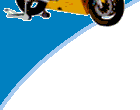



![]()
Wheels
![]()
Assembly
December 11, 2001
When adding tires to the wheels painted with metalizers, its easy to get
metallizer paint on the to the tires. Either from the parts touching or from
your fingers. To minimize this problem I put masking tape around the wheel that
the tire will fit on. Weaken the tape's grip by sticking to you pant leg, etc.
to reduce the tape's adhesion. I then slide the tire on. The tape acts as a
shield to keep the tire from touching the painted wheel. Once the tire is in
place, you can pull out the tape. If I do get metallizer on the tire side walls,
I used a cotton bud dipped in lacquer thinner to clean off the
paint.
![]()
Decals
This is the technique used by Junt-Kong Chan to apply
Tamiya's tire decals.
Use a pen and ruler to draw on the back of the decal backing paper a line which runs
through the center of all the decals (the '@' of the GOOD@YEAR or 'G' of EAGLE).
Do this before cutting the decals out.
- for GOOD@YEAR the 'G', 'Y' and '@' rest on roughly the same radius around the tire. This is usually on the peak of the tire sidewall.
- same for EAGLE
- or you can use a ruler to measure to some fixed points around the wheel (really, this is too much work!)
| If you have not noticed it, the placement of the printings on both sides of the tire sidewall in the real world is like this: | 
|
 |
| Outside | Inside |
![]()
Tire Mould Lines
If you build kits that have rubber or vinyl tires, there is an easy way to remove
the centerline seam. Placing the wheel and tire assembly on a low speed power drill and
run coarse sandpaper over the tire to remove it. Then use a finer sandpaper to give the
tire a uniform "scrubbed" look. Don't use a high speed tool like a
Dremel, it
turns too fast and will generate a lot of heat that could damage the tire and you might
injure yourself.
![]()
Tire Warmers
GP motorcycles use heated wheel covers to pre-heat the tires before going on the
track so the motorcycles will not be running on cold tires. It is very simple to make
these using facial tissue. Here is how to do it:
- Cut several pieces of facial tissue (don't use bathroom tissue as it will disintegrate when you wet it) to the proper size.
- Wrinkle up the tissue. Ball it up and smooth it out again.
- Dip the tissue in a 50/50 mix of water and white glue.
- Drape the wet tissue over the tire and use a blunt instrument (ie. eraser end of a pencil) to position it and wrinkle it up a bit.
- Brush some thinned white glue over the tissue.
- Let dry thoroughly and paint as usual.
- Add wires, markings, etc. to finish the cover.
This is a technique used by military modellers to make bed rolls, sheets of canvas, etc. The thicker the material the more layers of tissue you should use. Looks very convincing once painted.
This technique could also be used to make rider's gloves, umbrellas, etc.
![]()
Valve Stems
Sooner or later you will break off a valve stem when cleaning up the mould lines
on the wheels. Or when washing the wheels before painting.
To replace a value stem, simply CA glue a small length of wire to the original location. Then add a drop of Kristal Klear of white glue to the end of the wire. This will represent a cap. Once dry, you can shape the cap and then paint the valve stem.
|
|||||||||||||||
 Home - News - Tips - Gallery - Workshop - Kits - Links - What's New? - Site Index |